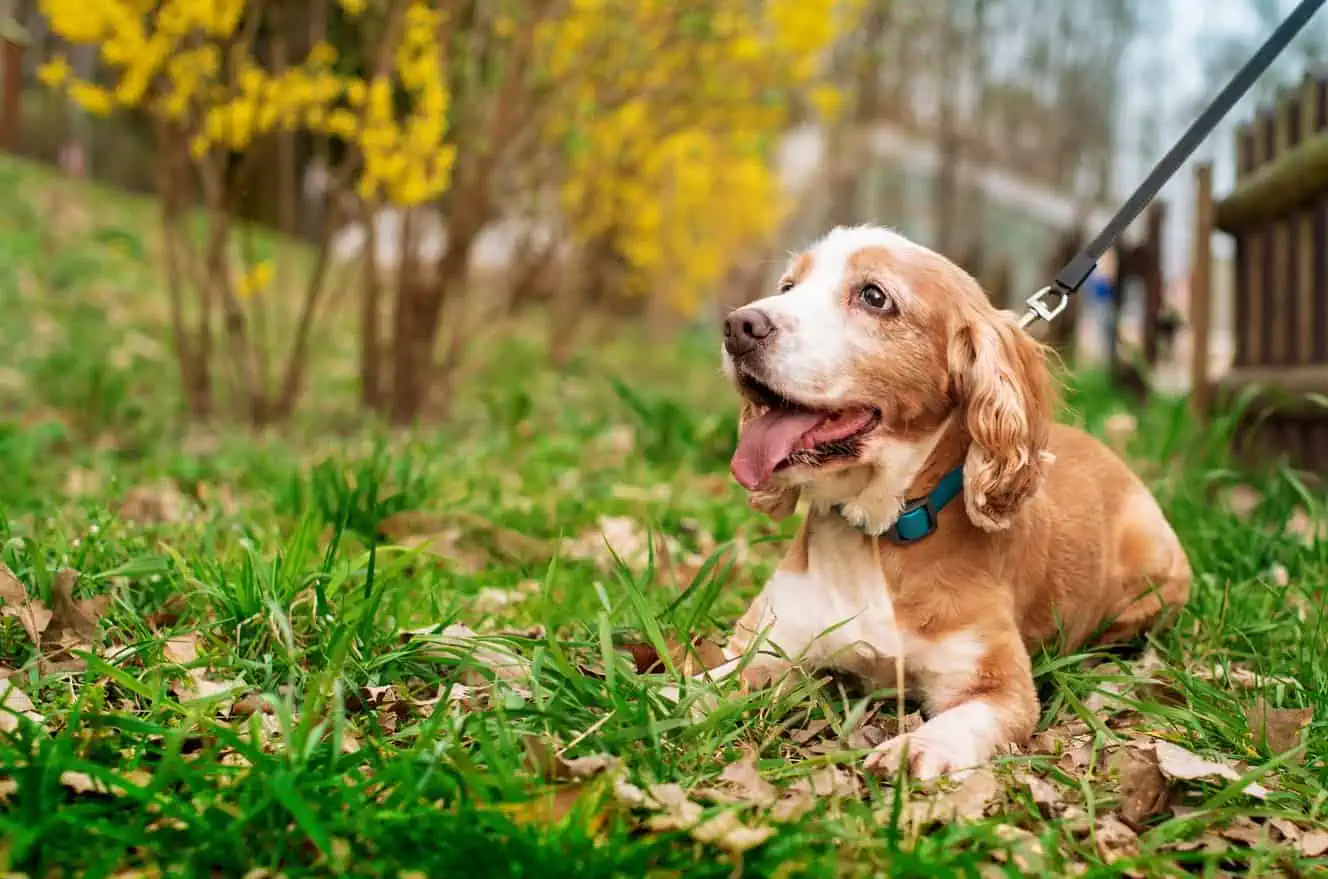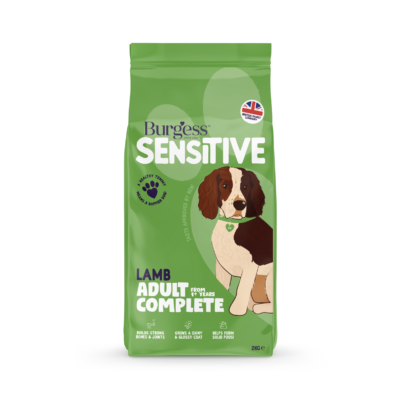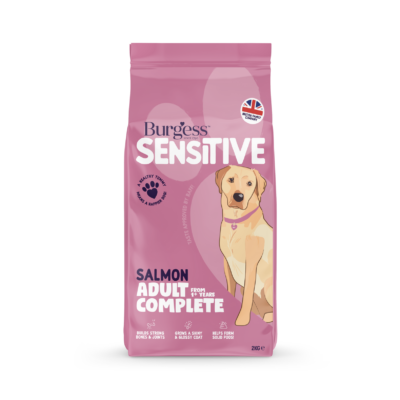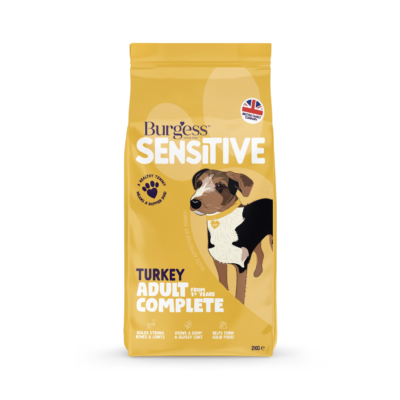
Kind, gentle and incredibly loyal, Cocker Spaniels can make excellent dogs for first-time owners, as long as you do lots of research to see if this energetic breed is right for you.
With their long, drooping ears, dark, trusting eyes and silky fur with the cutest curly ruffles, Cocker Spaniels are a medium-size dog that comes in a range of stunning colours. These include red, black, gold, liver, chocolate, black and tan, blue roan, along with several other colour combinations. They’re renowned as sociable dogs that quickly form strong bonds and simply adore being around other people and pets.
According to The Kennel Club, the breed's name derives from its original function, which was hunting woodcocks, noting: “The Cocker Spaniel earns the epithet 'the merry cocker' for his ever-wagging tail denoting his happy temperament.”
Cocker Spaniels just want to have fun
Famed children’s author Enid Blyton featured dogs in many of her stories including Loony, a black Spaniel, in the ‘Mysteries’ series. A star of all the adventures he appears in, Loony, who is said to have been based on Blyton’s own dog Laddie, loves stealing rugs, bathmats, towels, and any sort of brush, making a huge pile on the floor for ‘his humans’ to fall over. He also tears off at top speed all over the place and tries to trip people up. If you’ve ever known a Cocker Spaniel, then you’re probably nodding sagely at Ms Blyton’s observations of her mischievous pup!
What’s the best food for a Cocker Spaniel puppy? >>
Cocker Spaniels v working Cockers
Did you know that there are two strains of Cocker Spaniel – the show type and the working type (often referred to as working Cockers)? Each are bred for different purposes with different attributes.
Your Dog magazine explains: “Show-type Cockers are more commonly seen as family pets, and their compact size and appealing looks make them a popular choice. Working cockers are bred as working gundogs, and therefore have a lot of energy, as they need to have stamina in order to work all day. In the right hands, they make great pets for active homes, and are becoming an increasingly popular choice for those who participate in sports such as agility and flyball.”
What’s the best food for Working Cocker Spaniels? >>
Cocker Spaniel health concerns
While generally a healthy breed, there are some health concerns to consider.
Pet insurer Petplan advises: “There are certain health conditions that affect Cocker Spaniels more frequently than other dog breeds including dry eye (where the eye doesn’t produce enough tears which can result in chronic inflammation) and otitis, which is an inflammation of the ear canal.” Also look out for lumps and bumps that develop in the layers of fat, skin and muscle, and pancreatitis. This is an inflammation of the pancreas that occurs when the digestive enzymes within the pancreas start attacking it, so highly fatty food should be avoided.
PDSA also notes that Cocker Spaniels can be prone to allergies causing itchy skin and ear infections.
What’s the best food for Cocker Spaniels? >>
Dogs Trust advises: “Whatever the breed, all dogs need basic preventative health care like vaccinations and flea and worming treatments. You’ll also need insurance to help cover the cost of vet bills.”
Understanding what makes your Cocker Spaniel tick will help you give them everything they need to love life! Read on to discover more about:
- COCKER SPANIEL PERSONALITY PROFILE
- IS MY HOME SUITABLE FOR A COCKER SPANIEL?
- HOW MUCH EXERCISE DOES A COCKER SPANIEL NEED?
- WHAT SHOULD I FEED A COCKER SPANIEL DOG?
- HOW MUCH GROOMING DOES A COCKER SPANIEL NEED?
- WHAT’S THE BEST WAY TO TRAIN A COCKER SPANIEL?
- GETTING A COCKER SPANIEL
COCKER SPANIEL PERSONALITY PROFILE
Describing the breed as “an energetic, bouncy dog best suited to an active lifestyle,” Your Dog magazine adds: “It’s no great surprise that Cocker Spaniels are some of the most popular dog breeds in the UK today. With their friendly, inquisitive personalities and ever-wagging tails, these dogs make loyal and devoted companions.”
PDSA adds: “Cockers are very people-oriented dogs who love to have company with them all day. They’re very adaptable and suit city living just as well as the countryside as long as they have somewhere safe and secure so they can run about (and have lots of playtime with their owner, of course).”
The charity also recommends Cocker Spaniels as being a suitable breed for new dog owners, providing you have plenty of time to spend with them, stating: “Cocker Spaniels are a popular choice of breed for first time owners because of their gentle natures. Like most dogs, your Cocker will prefer to have company all the time. Without the right amount of stimulation and company, your Cocker Spaniel will likely try to entertain themselves – which might involve some of your furniture and belongings falling victim to nibbling and chewing.”
Crate training a Cocker Spaniel puppy – make it their special place >>
Whatever the breed, every dog is unique
While each breed has certain identifiable traits, it’s important to remember that every dog is unique.
Dogs Trust says: “Just like you, every dog is an individual with their own personality and prior experiences. As dogs grow from puppies, they learn all about the world. They develop their own likes and dislikes and learn to respond to situations in different ways. For example, some dogs might like meeting other dogs, and some may not. Some might like new experiences and others may need to go slowly.”
PDSA also stresses the importance of socialisation. “Socialising your Cocker Spaniel from a young age with a variety of people, dogs and experiences will help them develop into a confident and happy adult. They are a sociable breed by nature so you might find they like to say hello to everyone and anyone out and about.”
Want just YOUR dog to come when you call them? Choose their name wisely! >>
IS MY HOME SUITABLE FOR A COCKER SPANIEL?
To create a perfect canine/human partnership, it’s vital to think about what kind of energy and temperament you’d like your four-pawed friend to have so you’re a good match for each other – and that you can provide a suitable environment.
The Kennel Club recommends that Cocker Spaniels are quite happy in a small house with a small/medium garden in a town or country setting.
And, providing they have been well-socialised from a young age, Cocker Spaniels will get along with other dogs. PDSA adds: “If they have lived together from a young age, Cocker Spaniels are usually fine with cats and other small pets. They don’t have a high prey drive so may be able to be introduced to a cat under the right circumstances. Always supervise your Cocker Spaniel with other pets.”
Can cats and dogs be friends? >>
At the top of the list of Cocker Spaniel requirements is lots of time spent with their family. PDSA says: “Cocker Spaniels are known for suffering with separation anxiety, so it’s best to have someone with them during the day. It’s important that your Cocker is never left alone for more than four hours, but even this may be too much for your dog to handle. You’ll need to teach them that it’s OK to be alone for very short periods from a young age.”
Which breed of dog is the right fit for you and the place that you live? >>
Cocker Spaniels and children can be great friends
“Due to their patient personalities, Cocker Spaniels tend to get along well with children, which is why many families choose the breed,” notes PDSA. “Always supervise your Cocker Spaniel with children and vulnerable adults to avoid any accidents. While they are small dogs, they can be a bit excitable, so try to keep playtime with children as calm as possible and know when to step in if they get over excited.”
Petplan advises: “Sociable and adaptable, Cocker Spaniels love to be around people and live happily in busy family environments. Whilst they are very friendly with children and other pets, their high energy means they have a tendency to be boisterous and may be better suited to households with older children. As with all breeds, playtime between your Cocker Spaniel and children should be supervised to make sure everyone stays safe and happy.”
The family dog – making it work for pets and children >>
HOW MUCH EXERCISE DOES A COCKER SPANIEL NEED?
If you’re an active type who likes to spend lots of time outdoors in all weathers, then a Cocker Spaniel could be your perfect canine companion.
Dogs Trust says: “Cocker Spaniels are typically high-energy dogs who need lots of exercise to keep them physically and mentally healthy. They'll need daily walks, plus plenty of time and opportunity to explore, burn energy, and play. Like all dogs, they will need training and will benefit from daily enrichment. If you love spending active time outdoors, this breed could be a great match for you.”
PDSA adds: “Despite their smaller size, Cocker Spaniels still need a good amount of exercise every day to keep them active, healthy and stop them getting bored. They’re more than happy to go out walking a few times a day and love any opportunity to play with their owner. You may find that if your dog comes from parents bred to work, they’ll probably need more time to run around than your average Cocker Spaniel.”
The charity recommends that Cocker Spaniels need a minimum of an hour exercise every day, spread across the day, and have a few walks in with lots of opportunity to have a good sniff around, along with off-lead exercise in a secure area so they can run off their excess energy. Cocker Spaniels also need lots of playtime and will enjoy training sessions and games to challenge them.
How much exercise do different dog breeds need? >>
WHAT SHOULD I FEED A COCKER SPANIEL?
Burgess in-house vet, Dr Suzanne Moyes MVB MRCVS, who oversees recipe development and product production, advises: “When choosing food for Cocker Spaniels, it’s essential to bear in mind that the optimum diet for your dog is one that supplies the correct number of calories and balance of nutrients for their life stage and lifestyle. This means calculating the nutrient content and dietary components such as protein, fat, carbohydrate and vitamins and minerals required. All Burgess Dog Food is a complete food. This means, whatever variety you choose for your Cocker Spaniel, it will contain all the nutrients they need in the correct balance.”
The benefits of feeding a diet specially developed for a sensitive digestion
And, as Cocker Spaniels can be prone to allergies causing itchy skin and ear infections, and pancreatitis, choosing a food that’s specially designed for sensitive digestions could be beneficial.
Dr Moyes adds: “Dogs with delicate digestion or who suffer from allergies need sensitive dog food that’s made without many ingredients known to cause upset tummies. These ingredients can include beef, eggs, dairy, wheat, maize, and soya. For many canines with digestive issues or allergies, switching to a sensitive or hypoallergenic variety, depending on what your vet recommends, can make a world of difference to them.”
Your Cocker Spaniel will also benefit from feeding a variety of food that’s designed to meet their nutritional requirements throughout their life. Puppies need extra energy and other nutrients to support rapid growth. For adult dogs, providing a nutritionally balanced, complete diet will help keep them in tip top condition during the prime of their life. Many older dogs develop specific conditions, such as arthritis – some of which can be eased by feeding a diet designed just for them.
“Your Cocker Spaniel’s diet will vary depending on their age,” recommends PDSA. “You’ll need to feed them a complete, balanced dog food to keep them slim and healthy. Your vet will be able to tell you how much your Cocker Spaniel should be eating. You should feed them a good quality, commercially available, complete dog food. We usually recommend splitting their daily allowance into two meals. If you give your dog the occasional treat or use treats for training, remember to take this into account and reduce their daily allowance. Treats shouldn’t make up more than 10% of their daily calorie intake as this can unbalance their diet.”
The charity also recommends feeding your Cocker Spaniel at similar times every day as they like routine, remembering to leave a gap between eating and exercising.
Human food that you should never give to dogs >>
HOW MUCH GROOMING DOES A COCKER SPANIEL NEED?
If you have a Cocker Spaniel, then you’ll need to enjoy grooming as these dogs require plenty of it!
PDSA says: “Cocker Spaniels are high maintenance when it comes to grooming. They need a daily brush to stay on top of dead hair and stop their fur from tangling. You may want to give them a quick brush after their walks, too, to make sure there’s nothing stuck in their fur. You may need to take them to a professional groomer every three months to get them clipped as this will keep their coat in good condition.”
Regular grooming also provides you with an opportunity to check for unusual lumps and bumps and to see if ears are clean and healthy. Petplan adds: “Cocker Spaniels are prone to ear infections, as their long, heavy ears can prevent air from properly circulating the ear canal. Use your grooming sessions to check your dog’s ears for signs of infection, such a strange smell or black or brown wax.”
Cocker Spaniels are often keen swimmers, which could mean regular bathtimes are also required. Petplan notes: “As gundogs, Cocker Spaniels are naturally drawn to water – and with water comes mud! Bath your dog as often as necessary, making sure to use an appropriate dog shampoo to help limit skin allergies.”
Regular teeth cleaning is also important to help to prevent plaque and tartar from building up and keep gums healthy.
WHAT’S THE BEST WAY TO TRAIN A COCKER SPANIEL?
When it comes to training any dog, it’s all about positive learning, and, when it comes to Cocker Spaniels, you couldn’t have a more willing student.
PDSA says: “Cocker Spaniels were originally bred as gun dogs, so they’re particularly good at retrieving. They’re intelligent dogs with a real willingness to learn, so starting positive, reward-based training from an early age will be of benefit to you and them! Remember they pick up bad habits just as quickly as good, so training needs to be consistent throughout their life. If you’re a first-time owner or don’t have much experience of the breed, you may want to go to training classes with your dog.”
Dogs Trust advises: “Find out what your dog loves so you can use this to reward them after a success. Whether it’s small food treats, toys or lots of praise, training with rewards is the best way for your dog to learn. As dogs are clever animals, they need suitable mental and physical exercise so that they don't get bored. Learning useful life skills such as recall, loose lead walking and settling are just as important. This ensures that you and your dog can spend enjoyable time together, both at home and out and about.”
For expert advice and practical training guidance, visit Dogs Trust Dog School >>
GETTING A COCKER SPANIEL
PDSA advises: “If you buy from a breeder, make sure your puppy will be well socialised and have all necessary screening tests, health checks and vaccinations. It’s really important that Cocker Spaniel puppies from a breeder get the right early socialisation, so always ask the breeder about how they go about this. We recommend looking for a Kennel Club Assured Breeder as they meet higher standards.”
The comprehensive puppy checklist >>
Alternatively, there are a number of rescue organisations around the country, including The Kennel Club's Find a Rescue, Dogs Trust and breed-specific rescues that specialise in Cocker Spaniels such as Cocker & English Springer Spaniel Rescue and Second Chance Spaniel Rescue who would love to hear from you. Staff will seek to match you with the right dog for your home and lifestyle and provide you with support and useful information about the breed. By choosing a rescue Cocker Spaniel you’ll be giving one of these energetic, loving dogs a second chance at a happy and fulfilling life.
The best breed of dog is rescue >>
Need more advice?
If you’re at all unsure about the best way of feeding your dog or have any concerns about specific nutritional requirements, ask your local veterinary practice for advice. You can also call our expert team, available 9am-5pm, Monday to Friday, on +44 (0)1405 862241 who’ll be happy to help. Alternatively, use our online contact form to get in touch.
CARE MORE Find lots of useful advice on caring for your dog from Burgess, the pet experts >>
SOMETHING TASTY FOR EVERY DOG
Every dog deserves a first-class dinner from puppy to adult and senior. Burgess Pet Care is a British, family-owned company and all our dog foods are made at our own factory in the heart of Yorkshire, using only ingredients that meet our stringent specifications – locally sourced wherever possible to support British farmers
We’ve also developed foods to meet the specific nutritional needs of sporting and working dogs, Greyhounds and Lurchers and dogs with sensitivities.
All Burgess dog food is a complete food. This means, whatever variety you choose for your dog, it will contain all the nutrients they need in the correct balance. By choosing Burgess dog food, you know you can feed your canine companion with complete confidence.
With a whole host of *5 STAR REVIEWS*, our customers have told us:
* “Only food my puppy’s stomach can tolerate at the moment. Love this food!” * “Works well for my puppy and has made a great difference to his digestive system.” * “My doggy loves his food, and it is really good quality. Very happy with the product.” * “My dogs love it and have beautiful shiny coats.” * “My dog seems to like the senior food and it appears to have helped settle his sensitive stomach.” * “My two dogs enjoy the taste of the food. They seem happy and have more energy and bounce. Their coats are glossy and sleek. The end products are easier to pick up. After trying lots of other foods – I'm impressed.” *
Lamb? Turkey? Salmon? Your dog can try them all with our Burgess Sensitive Bundle >>
Is your dog a Burgess dog? Join the Burgess Pet Club for exclusive offers and rewards.
If you found this interesting, you may also like:
DOG DAYS From puppy to adolescent, through to adult and senior, as your dog goes through different stages, their exercise and nutrition needs change. Find out how to help them stay happy and healthy every day of their lives...
FLYING PAWS AND ROUNDS OF APPLAUSE – WOULD YOUR DOG BE GOOD AT DOG AGILITY? Do you have a dog that’s simply bursting with energy? Would you like to be involved in an activity together, that involves reward-based training, competing in shows and hanging out with lots of other lovely dogs and their owners? Then dog agility could be just right for you and your canine chum.
ARE YOU AND YOUR DOG GOOD SPORTS? One of the many things that dogs and humans have in common is that we both benefit from physical activity. While going for a long country walk is one way to do it, there is nothing like a fun, teamworking activity to keep your dog fit, mentally stimulated and to build that special bond between you.
OPEN UP YOUR EYES TO YOUR DOG’S WORLD Understanding how your four-pawed pal interprets the world through their five senses can help you provide them with the best, most enriching life.
FUN AND GAMES IN THE DOG PARK Going to the park is the highlight of many dogs’ day as it’s a chance for canine chums to enjoy a meet and greet and dash about with their best buddies. However, not every dog-to-dog interaction goes to plan and there are definite rules of the game to be followed.
BACK TO DOG SCHOOL Training is an essential part of dog ownership and, whatever age your dog is, training should be part of their regular routine.
BEST BEHAVIOUR – HOW TO TRAIN YOUR DOG TO MAKE A POLITE HELLO Most dogs get really, really excited when they meet a friendly human on their walk – Jumping up, twirling and barking. While this can be cute when they’re a small puppy, it’s not so good when they grow into their paws and jump all over the person in question!
BACK SOON All dogs benefit from learning to manage being on their own for short periods. Otherwise, if you have to leave your dog and they aren’t used to it, it will be very stressful for them.
HOW TO TEACH YOUR DOG THAT IT’S CHILL OUT TIME Are you struggling to find your dog’s off button? While some canines are natural couch potatoes, others need a little encouragement to learn to settle down and be calm. Our expert step-by-step training plan can help.
GIVE THE DOG A CHOICE As humans, our lives consist of choices. Yet, how much of a say do our dogs have about what they do, how they do it and when? Could letting them make their own decisions really make them happier?
DOG TRAINING MYTHS BUSTED All sorts of people have opinions on the best ways to train a canine – but it’s essential to only take advice from expert, trusted sources.
DOG BEHAVING BADLY? What’s the thing that your dog does that you find baffling, frustrating or even downright annoying? Barking at people walking past the window, ripping up the post, digging holes in the lawn, eating food out of the bin or running off with your slippers?
ARE YOU READY FOR A DOG? Taking on a dog is a huge decision. It requires money, time and commitment. Here are some of the things you’ll need to consider...
PET INSURANCE EXPLAINED Can you get pet insurance for pre-existing conditions? Can you get pet insurance for older pets? Can you get multi-pet cover? We answer some of the most commonly asked questions to help you make an informed decision about pet insurance.
PROTECT YOUR PET’S HEALTH DURING THE COST-OF-LIVING CRISIS There’s no doubt that this can be especially challenging during the current cost-of-living crisis. However, there’s lots you can do – and help is available for people and pets most in need.
FAD DIETS – SHOULD DOG OWNERS BE WORRIED? Raw, grain free or home-cooked? The range of options for feeding your dog seems to be ever expanding. But what do animal nutrition experts have to say about it?

















